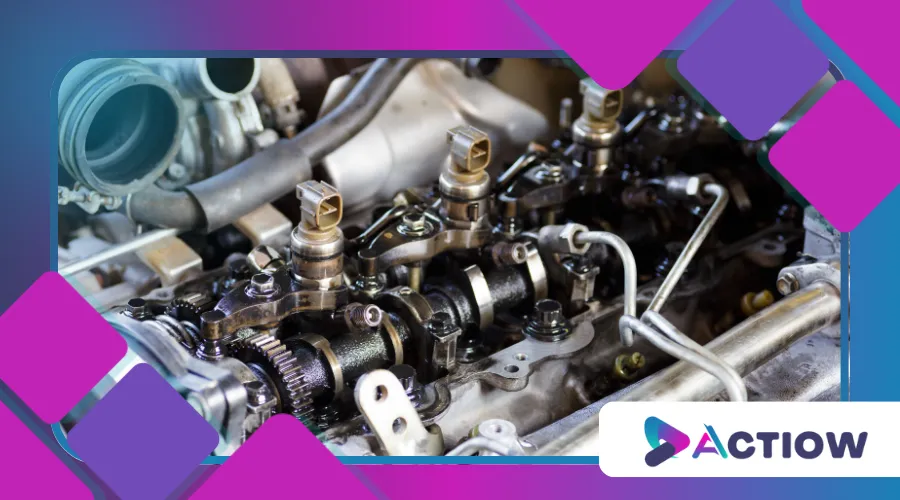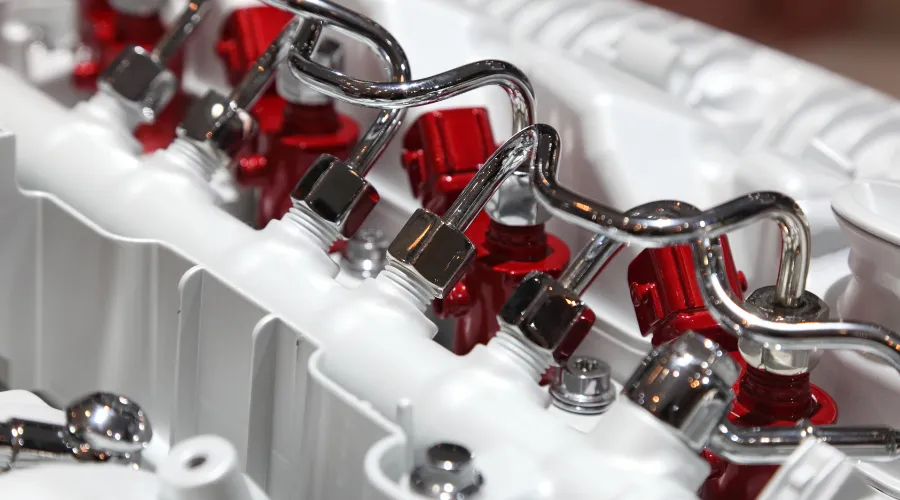Tips for Keeping Your Fuel Injection System in Good Shape

Anúncios
Maintaining your fuel injection system in good shape is the cornerstone of a smooth-running vehicle, ensuring optimal performance, fuel efficiency, and longevity.
Your car’s fuel injection system is the heart of its engine, delivering precisely measured fuel to the combustion chambers for power and efficiency.
Neglecting it can lead to sluggish performance, poor gas mileage, and costly repairs.
Anúncios
With modern vehicles relying heavily on sophisticated fuel injection technology, proactive care is more critical than ever.
This guide offers actionable, creative, and intelligent tips to keep your system humming, blending practical advice with fresh perspectives to help you avoid common pitfalls and maximize your car’s potential.
Understand the Fuel Injection System’s Role
Think of your fuel injection system as a master chef, meticulously balancing ingredients to create the perfect dish—your engine’s power.
This complex network of injectors, fuel pumps, sensors, and control modules ensures the right amount of fuel mixes with air at the right time.
A 2023 study by the Automotive Research Association found that 68% of engine performance issues stem from fuel system neglect, highlighting the need for regular maintenance.
By keeping your injection system in good shape, you prevent misfires, reduce emissions, and maintain the engine’s responsiveness.
So, why let such a critical component fall into disrepair?
Start by familiarizing yourself with how your system works.
Electronic fuel injection (EFI), common in vehicles since the 1980s, uses sensors to monitor air intake, throttle position, and engine temperature, adjusting fuel delivery in real time.
Unlike older carburetor systems, EFI demands precision.
Dirt, carbon buildup, or worn components can disrupt this delicate balance, leading to inefficient combustion or even engine damage.
Knowledge is your first tool—understand what your system does, and you’ll be better equipped to care for it.
Explore resources like HowStuffWorks for a deeper understanding of fuel injection systems.
Use High-Quality Fuel for Long-Term Health
Fuel quality directly impacts your injection system’s performance.
Low-grade gasoline, often laden with impurities, can clog injectors and leave deposits that hinder fuel flow.
Opt for top-tier fuels from reputable brands that include detergents to clean injectors and prevent buildup.
These fuels, certified by the Top Tier Detergent Gasoline program, are formulated to keep your injection system in good shape by reducing carbon deposits by up to 45% compared to lower-quality options.
Example 1: The Road Trip Revelation
Imagine Sarah, a busy professional, embarking on a cross-country road trip in her 2020 Honda Civic.
She consistently filled up at budget gas stations to save a few bucks.
Halfway through her journey, her car began hesitating during acceleration, and her fuel economy dropped noticeably.
A mechanic diagnosed clogged injectors caused by low-quality fuel.
Switching to a top-tier brand and adding a fuel system cleaner resolved the issue, but not before costing her a $200 service bill.
Sarah’s lesson? Investing in quality fuel upfront saves money and hassle.
Regular Maintenance: The Key to Longevity
Routine maintenance is non-negotiable for keeping your fuel injection system in good shape.
Replace your fuel filter every 20,000 to 30,000 miles, as recommended by most manufacturers, to prevent contaminants from reaching the injectors.
A clogged filter restricts fuel flow, forcing the pump to work harder and potentially causing premature wear.
Additionally, inspect the fuel pump and pressure regulator during routine services to ensure consistent fuel delivery.
| Maintenance Task | Recommended Interval | Purpose |
|---|---|---|
| Fuel Filter Replacement | Every 20,000–30,000 miles | Prevents contaminants from clogging injectors |
| Fuel Injector Cleaning | Every 30,000–50,000 miles | Removes deposits for optimal fuel spray |
| Fuel Pump Inspection | Every 50,000 miles | Ensures consistent pressure and flow |
Beyond filters, consider professional fuel injector cleaning every 30,000 miles.
Ultrasonic cleaning, performed by mechanics, uses high-frequency sound waves to dislodge stubborn deposits, restoring injector performance.
For DIY enthusiasts, fuel system additives from trusted brands like Chevron or BG Products can help, but they’re not a substitute for professional care.
Regular maintenance isn’t just about preventing breakdowns—it’s about preserving the precision that keeps your engine purring.

Monitor Engine Performance for Early Warning Signs
Your car often signals when its fuel injection system needs attention.
Symptoms like rough idling, hesitation during acceleration, or a sudden drop in fuel economy are red flags.
These issues often arise from clogged injectors, faulty sensors, or a failing fuel pump.
Ignoring them can escalate minor problems into major repairs, with injector replacement costing $1,000 or more for some vehicles.
Pay attention to your check engine light—it’s your car’s cry for help.
Use an OBD-II scanner to read diagnostic codes, which can pinpoint issues like a malfunctioning oxygen sensor or fuel pressure problem.
Addressing these early can prevent further damage and keep your injection system in good shape.
For instance, a faulty mass airflow sensor can disrupt the air-fuel ratio, causing inefficient combustion and stressing the injectors.
Example 2: The Commuter’s Catch
Mark, a daily commuter, noticed his 2018 Toyota Camry felt sluggish and was guzzling gas.
His check engine light illuminated, and a quick scan revealed a P0171 code, indicating a lean fuel mixture.
A mechanic traced the issue to a dirty mass airflow sensor, which was cleaned for $100, restoring performance.
Had Mark ignored the warning, his injectors could have been damaged, costing far more.
His proactive approach saved his system and his wallet.
+ How to Save on Tire Replacement Without Compromising Safety
Embrace Fuel Additives with Caution
Fuel additives can be a double-edged sword.
When used correctly, quality additives clean injectors, stabilize fuel, and prevent corrosion, helping maintain your injection system in good shape.
However, not all products are created equal.
Avoid cheap, generic additives that promise miracles but may leave harmful residues.
Stick to reputable brands, and use additives sparingly—once every 3,000 to 5,000 miles is sufficient for most vehicles.
| Additive Type | Benefits | Recommended Brands |
|---|---|---|
| Injector Cleaner | Removes carbon deposits | Chevron Techron, BG 44K |
| Fuel Stabilizer | Prevents fuel degradation | STA-BIL, Lucas Oil |
| Corrosion Inhibitor | Protects system components | Sea Foam, Red Line |
Be wary of overusing additives, as excessive chemicals can harm seals or sensors.
Always follow the manufacturer’s dosage instructions, and consult your vehicle’s manual to ensure compatibility.
Think of additives like vitamins—helpful in moderation but not a cure-all.
Drive Smart to Reduce System Stress
Your driving habits play a surprising role in fuel system health.
Short trips, frequent stops, and aggressive acceleration can strain the system, leading to carbon buildup and injector wear.
To keep your injection system in good shape, incorporate longer drives periodically to allow the engine to reach optimal operating temperature, which helps burn off deposits.
Avoid idling for extended periods, as it promotes incomplete combustion and residue buildup.
An analogy to consider: Your fuel injection system is like an athlete’s lungs.
Just as an athlete needs regular exercise to stay in peak condition, your car benefits from consistent, varied driving to keep its components clean and functional.
Highway driving, for example, allows the system to cycle through fuel efficiently, reducing the risk of clogs.

Upgrade Components for Enhanced Performance
For enthusiasts or those with older vehicles, upgrading certain fuel system components can boost efficiency and durability.
High-performance fuel pumps or precision injectors designed for your vehicle can improve fuel delivery and atomization, enhancing combustion.
However, upgrades should be done thoughtfully—consult a professional to ensure compatibility with your engine’s specifications.
If you’re considering modifications, prioritize quality over cost.
Aftermarket injectors from trusted brands like Bosch or Denso are engineered for reliability, unlike cheap knockoffs that can fail prematurely.
Upgrading isn’t just about power—it’s about ensuring your injection system in good shape can handle increased demands without compromising longevity.
++ Headlight Maintenance: How to Ensure Good Night Visibility
Environmental Factors and Their Impact
Your car doesn’t operate in a vacuum—external conditions affect its fuel system.
Extreme heat can cause fuel to evaporate, stressing the pump, while cold weather can thicken fuel and strain injectors.
Dusty or humid environments increase the risk of contaminants entering the system.
Use a high-quality air filter to protect the intake system, and store your vehicle in a garage to minimize exposure to harsh conditions.
During winter, consider a fuel additive with anti-gel properties to prevent fuel line freezing.
In hot climates, check for vapor lock, where fuel boils in the lines, disrupting delivery.
Simple steps like parking in the shade or using reflective windshield covers can mitigate heat-related stress, keeping your injection system in good shape.
The Cost of Neglect vs. the Value of Care
Why gamble with your vehicle’s performance when proactive care is so accessible?
Neglecting your fuel injection system can lead to a cascade of problems—reduced fuel economy, increased emissions, and costly repairs.
According to AAA, the average cost of fuel system repairs ranges from $500 to $2,000, depending on the issue.
In contrast, routine maintenance like filter replacements and injector cleaning costs a fraction of that, often under $200 annually.
Investing in your fuel system’s health isn’t just about avoiding breakdowns—it’s about maximizing your car’s efficiency and lifespan.
A well-maintained system improves gas mileage by up to 10%, saving you money at the pump.
Plus, it reduces your environmental footprint by lowering emissions, a win for both your wallet and the planet.
Conclusion: Take Control of Your Fuel System’s Future
Keeping your fuel injection system in good shape isn’t a one-time task—it’s a commitment to your vehicle’s performance and reliability.
By using quality fuel, sticking to a maintenance schedule, monitoring performance, and driving smart, you can prevent costly issues and enjoy a smoother ride.
Whether you’re a daily commuter or a weekend warrior, these tips empower you to take control of your car’s health.
So, what’s stopping you from giving your fuel system the care it deserves?
Start today, and let your engine thank you with every mile.
